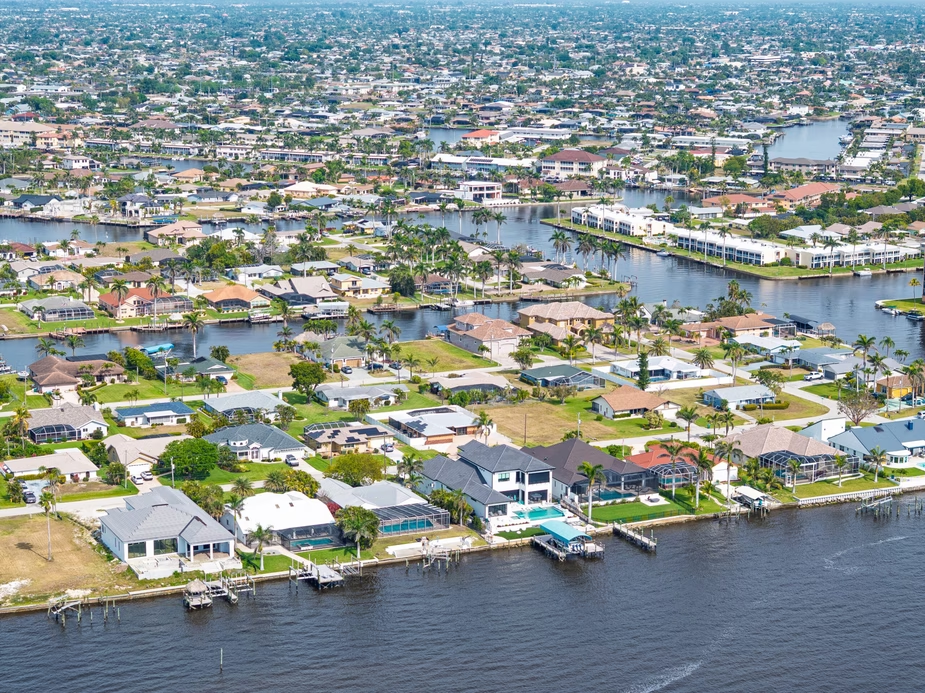Categories
International Market Trends, Real Estate NewsPublished November 12, 2025
Canadian Snowbirds Are Ducking Out of the U.S. Housing Market Over Trump Tariffs—but These Sun-Soaked Spots Still Shine

By Snejana Farberov
Canadian homebuyers are increasingly turning away from U.S. housing markets amid the ongoing tariff dispute between the two countries, but despite the pullback, Canadians continue to account for the largest share of international demand.
Between July and September, Canadian house hunters handily topped the list of foreign property buyers in the U.S., making up nearly a third of international traffic on Realtor.com®, according to the latest quarterly International Demand report.
For context, the second-largest contingent of overseas investors—shoppers from the U.K.—accounted for a fraction of Canada’s demand, at just 6.5% of the traffic, followed by Mexican buyers, at 5.6%.
However, year-over-year data suggests that Canadians are gradually losing interest in stateside vacation homes and investment properties, with online shopping traffic from Canada declining 4.5 percentage points—from 36.6% in Q3 2024 to 32.1% in Q3 2025.
"This retreat coincided with the period during which the U.S. imposed a series of tariffs on Canadian goods, sharply adjusting prior trade relations with the neighbor to the North," says Realtor.com economist Jiayi Xu.
In August, President Donald Trump raised tariffs on Canadian imports to 35%, but due to an exemption, 85% of all U.S-Canada trade has remained tariff free.
Then in mid-October, a 10% tariff on all timber and lumber from Canada went into effect, in addition to a 25% levy on cabinets and furniture.
And last weekend, Trump said he was slapping an additional tariff of "more than 10%" on Canada in retaliation for the government of Ontario's ad criticizing America’s trade policies.
"The Venice of America" still attracts Canadians
Canadian snowbirds willing to look past the difficult geopolitical climate were disproportionately drawn to America's sunny destinations offering refuge from their homeland's bitterly cold winters.
Among the most popular markets, Canadian buyers dominated the international traffic to Cape Coral, FL, making up 61.4% of the metro's foreign demand.
Karen Borrelli, president of Royal Palm Coast Realtor® Association, tells Realtor.com that while there have been fewer home sales to Canadians so far this year compared to the same period in 2024, America's northern neighbors continued to dominate the market among international buyers.
"The consensus is that we are still seeing the Canadians who love the Cape Coral lifestyle," says Borrelli, referencing her recent conversations with local real estate professionals.
Nicknamed "the Venice of America," Cape Coral features over 400 miles of canals, many of them with golf course access, making it an attractive waterfront living destination that is still relatively affordable, according to Borrelli.
"What the draw is the fact that you could have your boat right in your backyard, load up, go out," adds Borrelli. "You could go down to Key West or up to Tampa, so it's a boating destination."
For those not interested in spending their days out on the water, Cape Coral boasts nearly 40 parks, pickleball courts, and family attractions like go-karts and mini golf.
According to the latest data from Royal Palm Coast Realtor Association, 1,100 single-family homes in the city are currently owned by Canadian nationals, with the average sale price topping $941,000.
The typical Canadian buyer in Cape Coral favors single-family homes with open floor plans and sprawling yards, complete with outdoor fireplaces and kitchens.
Borrelli says that while attending a trade show in Toronto earlier this year, she heard mixed opinions from Canadians about buying real estate in Florida.
"There were a lot of Canadians who said that they would no longer be going to Florida," she says. "They were choosing Mexico instead. But then there was about just as many that said they loved Florida and they wouldn't go anywhere else, no matter what."
The real estate association president attributes this ambivalence to new tariffs, a weaker Canadian dollar, and Florida's hurricane-driven home insurance woes, but Borrelli remains optimistic about the future.
"Canadians have been coming to this area for so long that it's sort of a cycle," she explains. "I think as long as people want to come to sunshine ... I think that they'll continue to purchase here."
Final Thoughts
Despite tariff tensions and economic headwinds, Canada remains the leading source of international homebuyers in the U.S., proving that the allure of warm-weather living continues to outweigh trade politics for many snowbirds. While some Canadians are retreating from traditional hotspots like Florida due to tariffs, a weak Canadian dollar, and insurance challenges, destinations like Cape Coral still shine as prime choices for lifestyle and leisure. The data points to a recalibration rather than a retreat—where enduring demand for sun, space, and the American lifestyle keeps cross-border interest alive, even in a cooling global market.





